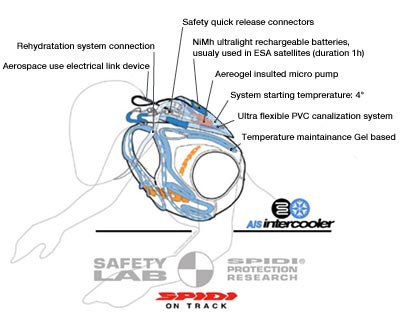Motorcyclists keep their cool
Spain's Sete Gibernau (centre) wins the Qatar Moto Grand Prix at the Losail circuit near Doda, Qatar, 2 October 2004. He was cooled during the race by the Anatomic Intercooler System (AIS) jacket developed by Spidi using innovative space technology from astronauts' suits. Here he is seen on the podium celebrating the victory with second-placed Colin Edwards from the US, left, and third-placed Ruben Xaus from Spain, right. Credits: AP Photo/Kamran Jebreili
A motorcycling jacket using space technology is on hand to chill MotoGP riders racing this weekend in Malaysia and next weekend in Qatar, should the heat require it.
Sete Gibernau with Gze Cooling-Sytem The Anatomic Intercooler System (AIS) jacket was developed by Italian bike clothing company Spidi and was used last year by Spanish rider Sete Gibernau at the world's hottest motorbike Grand Prix at the Sepang circuit in Qatar.
It keeps the rider cool inside the suit, helping to maintain a low body temperature even in sweltering desert temperatures. The novel technology used was originally developed for astronauts' space suits. Internal cooling is needed to allow astronauts to withstand high temperatures occurring during sun exposure in open space.
"The AIS turned out to be very efficient at Qatar last year. It was used by Sete Gibernau in combination with our hydro-back system, making it possible for him to drink while racing," explains Mattia Vincenzi from Spidi.
The technology was made available for Spidi by ESA's Technology Transfer Programme (TTP) and the Italian textile research laboratory Grado Zero Espace (GZE), which has already developed several products using sometimes highly unusual space technologies.
"We started the work in 2000-2001 with Italian Grado Zero Espace of transferring cooling technologies from astronauts' space suits to clothing for people in hot places on Earth," says Pierre Brisson, Head of ESA's Technology Transfer and Promotion Office.
"This has led to several other very interesting spin-offs, in addition to the AIS from Spidi."
A cooling overall was developed for McLaren's Formula 1 mechanics, and Henri Pescarolo wore a special helmet with a built-in cooling system while racing in the Dakar 2003 Rally. It turned out to be very efficient in the Saharan heat.
The cool jacket
The AIS is an anatomic cooling system produced to keep the riders' body temperature low even in extreme heat conditions. It is integrated into a conventional racing suit, offering improved comfort and safety.
"The most difficult thing was to integrate all the AIS vital components together with the anatomy of the suit, because we just could not compromise on the original safety and fitting of Sete's suit. It's been tough, but in the end we are really satisfied by the result", explains Lorenzo Faggionato, Spidi chief racing developer.
The cooling system is based on icy-gel-cooled water running through a tube that weaves across the chest and back within a custom-made anatomic vest to be worn under the suit. An ultra-light battery drives a micro pump to circulate the water.
Wearing the AIS system with the hydro-back system, holding about half a litre of water sufficient for a 40-45 minute race, the rider is guaranteed a comfortable body temperature even in extreme hot weather. In addition, riders can drink whenever they need to, no matter how fast they are going.
Improving driving conditions increases both performance and safety, and the two systems are now under evaluation by Spidi for commercial motorcycle jackets.
Greetings to http://www.esa.int


